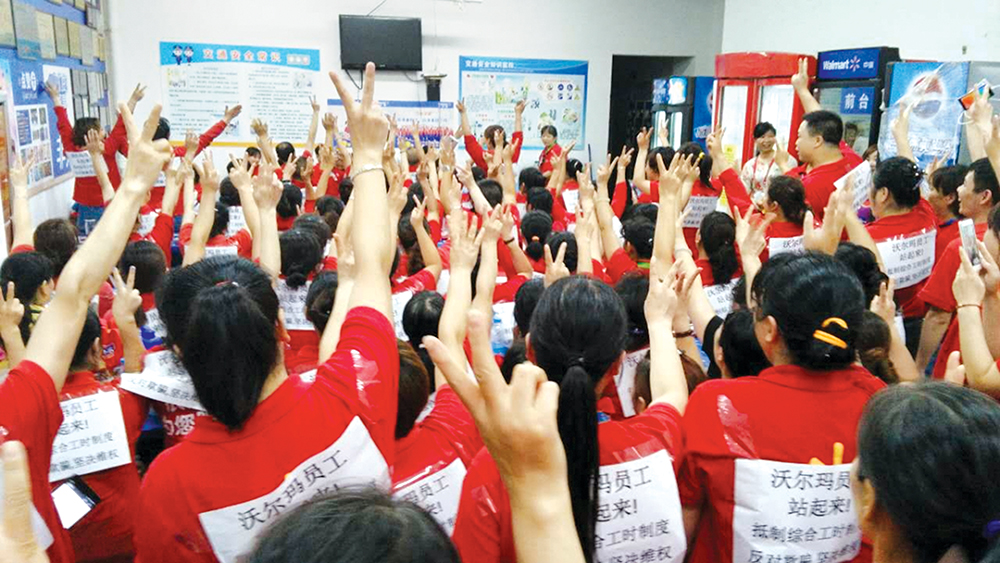May 2021 | Volume 22 No. 2
Cover Story
Workers of the World, Divided
(Courtesy of LaborNotes)
In the 1970s, democratic United States and authoritarian China began to witness trends in the regulation of workers’ collective rights that, today, have resulted in puzzling similarities.
Both countries increasingly prioritised contractual arrangements between employers and individual workers, rather than collective rights and active participation in decision-making. In the United States, unions became progressively weakened while workers were granted a growing number of grounds to sue employers solely on an individual basis.
In China, economic reforms shifted from the ideal that the workers and the State were a unified entity grounded in guaranteed employment, to that of a labour market that, like the US, commodifies and regulates labour through private contracting with individual remedies.
To Dr Jedidiah Kroncke, a scholar of comparative labour law in the Faculty of Law, these developments present an unsettling paradox.
“You would presume the workplace would be structurally different under liberal and authoritarian regimes,” he said. “But here are two different countries and political systems that are both increasingly moving towards a contractarian view of the workplace without any reference to liberal or social democratic norms. Labour relations are seen as just another economic transaction, like the exchange of most any other commodity.
“Even though in some substantive sense working conditions are generally harsher in China, at a basic level the US and China are converging on this idea that labour is just about a contract, it’s not about anything collective, it’s certainly not about workers’ participation in enterprise decision-making.”
That matters for several reasons, he said. At the societal level, one would expect a country’s political and economic systems to reflect similar values. “Normatively, political and economic citizenship should be coherently integrated and the workplace should be a key forum where such values are promoted,” he said. “If you really believe in democracy, it has to be lived in the workplace, which is the dominant social experience for most citizens beyond the family.”
Undesirable outcomes
At the individual level, people derive meaning and agency from work, much more than from the political arena. If they are disempowered in the workplace, it can lead to discontent.
“Work traditionally grounds people’s sense of meaning and community. When you take that away, they become very susceptible to finding those things in other, often less socially constructive, places,” he said.
This outcome is evident in the ongoing labour unrest in China and the rise of tribalism in the US and other countries where unions have been weakened, employment contract law has been on the rise, and governments have adopted the view that any form of worker empowerment promotes inefficiency.
China on the surface may seem an exception because every company has workers’ councils or state-backed unions. “There’s a form of unionisation there, but it’s not to empower workers to participate. It’s to keep a lid on labour unrest,” which is regarded as a threat to stability, he said.
Another point of convergence has been attempts to address this issue by allowing workers to hold shares in companies, though this is also not all that it seems. In the US, special trusts have been promoted to hold shares for workers, but the nature of this ownership ultimately gives workers little control over how the company is run. In China, Huawei is a parallel example where most of the company’s shares are held by the state-backed union, but without leading to any real governance input and with the original owner (technically a minority owner) retaining large governance powers. “In both situations, worker participation in governance is not seen as valuable or desirable,” he said.

Chinese workers at Walmart holding wildcat strike.
(Courtesy of LaborNotes)
No easy responses
Dr Kroncke said the convergence perspective may help explain why economic globalisation spearheaded by the US has been so readily adopted by authoritarian regimes, and why economic opening has not led to greater democratisation in China. Most relations between the US and China are conducted not through diplomatic or cultural exchange but corporations, and American corporations are internally authoritarian, not democratic.
The reception to these observations has often not been warm, he said. People in both China and the US believe their legal systems are exceptional and resist comparison. But Dr Kroncke, who also trained as an anthropologist, believes comparison provides the larger picture of labour rights around the world. “These are really conversations about first principles – about what is a good life,” he said.
Responses to this troubling convergence are still being formulated. Ideas like universal basic income and job guarantees are increasingly being discussed to address labour commodification, as well as automation and rising inequality. Alternative labour institutions that give workers more say in the workplace have also been suggested, although he cautions against the disabling effect of utopian ideas about worker participation.
“A lot of people in the 20th century got used to the idea of progress, that things would keep getting better. Unfortunately, from an anthropological perspective, human history is cyclical,” he said. “We’re going through a period where we can’t ignore that things haven’t worked out for everyone.”
At a basic level the US and China are converging on this idea that labour is just about a contract, it’s not about anything collective, it’s certainly not about workers’ participation in enterprise decision-making.

DR JEDIDIAH KRONCKE

